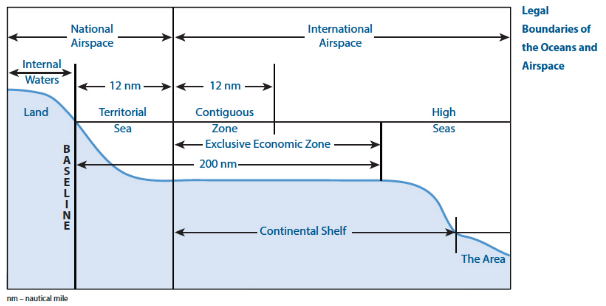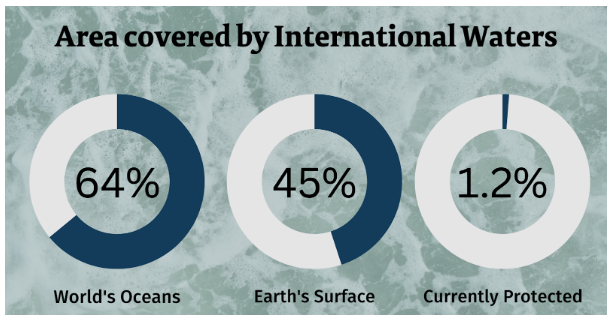Context:
Recently, UN member states agreed on a historic treaty for protecting marine life in international waters that lie outside the jurisdiction of any country.
- The ‘breakthrough’ followed talks led by the UN during the Intergovernmental Conference (IGC) on Marine Biodiversity of Areas Beyond National Jurisdiction (BBNJ) where negotiations were underway for the past two weeks.
- The treaty is yet to be formally adopted as members are yet to ratify it.

Image Source: NOAA Ocean Exploration
What are the High Seas?
- According to the 1958 Geneva Convention, the high seas are the parts of the ocean beyond a country’s Exclusive Economic Zone.
- It extends up to 200 nautical miles from the coast, and no country is responsible for managing or protecting its resources.
How important are the high seas?
- Importance and Extent of the High Seas: The high seas account for more than 60% of the world’s ocean area and cover about half of the Earth’s surface, which makes them a hub of marine life.
- Biodiversity of the High Seas: They are home to around 2.7 lakh known species, many of which are yet to be discovered.
- Threats to Marine Life: The high seas are fundamental to human survival and well-being. However, these oceans absorb heat from the atmosphere, are affected by phenomena like the El Nino, and are also undergoing acidification — all of which endanger marine flora and fauna.
- Several thousand marine species are at a risk of extinction by 2100 if current warming and acidification trends continue.
- Anthropogenic Pressures on the High Seas: It include seabed mining, noise pollution, chemical spills and fires, disposal of untreated waste (including antibiotics), overfishing, introduction of invasive species, and coastal pollution.
- Lack of Protection for the High Seas: Despite the alarming situation, the high seas remain as one of the least-protected areas, with only about 1% of it under protection.

Image Source: The Hindu
How long did the process take?
- In 1982: The UN Convention on the Law of the Sea, or UNCLOS was adopted.
- The Convention delineated rules to govern the oceans and the use of its resources. But there was no comprehensive legal framework that covered the high seas.
- In 2015: After years of informal discussions, the UNGA decided to develop a legally binding instrument within the framework of UNCLOS.
- In 2022: The European Union launched the High Ambition Coalition on BBNJ to finalise the agreement at the earliest.Subsequently, the IGC was convened to frame a legal instrument on BBNJ.
What is the Treaty?
- Draft agreement of the ‘High Seas Treaty’ recognizes the need for biodiversity conservation
- The ‘High Seas Treaty’ proposes to protect 30% of the world’s oceans and increase funding for marine conservation
- An important negotiating point, and source of tension during the talks, was developing countries’ access to benefits reaped from the commercialisation of resources (especially genetic resources) extracted from the ocean.
- The treaty has agreed to set up an access- and benefit-sharing committee to frame guidelines.
- Activities concerning marine genetic resources should be in the interests of all states and for the benefit of humanity.
News Source: The Hindu
![]() 9 Mar 2023
9 Mar 2023

